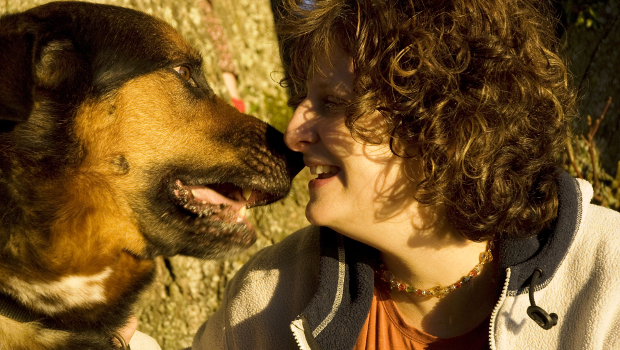Dr. Jessica Chubak and team ROAR: Research on Animal-human Relationships

Rene Hawkes, ROAR interest group member, with Pratt. Photo credit: Deb Casso.
A study to help kids with cancer get time with pets begins field work, with encouragement from a GHRI interest group
Do animals help relieve stress? Look at the faces of people interacting with their pets, and you will see the stress-reduction process happening. Research shows a link between human-animal interactions and reduced human distress. That’s why Group Health Research Institute (GHRI) Associate Investigator Jessica Chubak, PhD, launched the PORPOISE study (Pediatric Oncology Research on Pets in Outpatient and Inpatient Settings) on the potential benefits and risks of bringing animals into health care settings.
With funding from the National Cancer Institute and the GHRI Development Fund, supplemented with a successful crowdfunding campaign, PORPOISE is developing trials of animal-assisted activities (AAA) for youth with cancer. This year, after getting the necessary human subjects approval, the study team began learning from patients and parents in interviews and surveys, engaging with health care providers via focus groups, and planning a small pilot study of AAA in a hospital pediatric oncology unit. Nearly 20 interviews with young inpatients at Seattle Children’s Hospital have been completed, and focus groups with providers are due to begin soon. The hope is that PORPOISE will lead to larger studies to test whether children with cancer can have safe access to visits from pets to calm them as they navigate the health care system with their families.
With pet-loving colleagues, Dr. Chubak also founded ROAR (Research On Animal-human Relationships), a GHRI special interest group that studies and discusses research developments and promising projects looking at the healing power of the animal-human relationship.
“We hope that a pilot study isn’t too far off,” says Dr. Chubak. “One of the most memorable parts of PORPOISE has been witnessing patients receive animal-assisted therapy and watching their faces light up.”
Dr. Chubak was inspired by her volunteer work after college with children and families, in which she observed firsthand that play distracted people from the strain and unfamiliarity of being in a hospital setting. After learning about the Pet Partners program and promising preliminary work in Canada, Dr. Chubak decided to include AAA for children with cancer in the research program she is building at GHRI. Her goal is to study its effectiveness and safety for kids and teens with cancer and to expand this work into other settings.
The GHRI ROAR team is actively seeking additional ways to study the healing aspects of the special bond between people and pets. See links to studies that ROAR is learning from and get updates on Dr. Chubak’s work on her animal-assisted interactions research community Facebook page.
Dona Cutsogeorge is a writer with the MacColl Center for Health Care Innovation at Group Health Research Institute.



